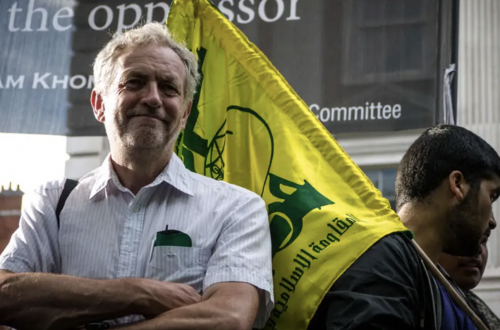We do not know much about Thomas Mair, the man accused of the assassination of Jo Cox.
We know that he may have shouted “Britain First”, or “Put Britain First” as he fired the fatal shots, but we do not know whether he had any association with, or read the material put out by the far Right organisation that calls itself Britain First. We know that, over a decade ago, a man with the same name and living in the same town was reported as having ‘gone missing’ by a pro-Apartheid far-Right newsletter called SA Patriot.
A Thomas Mair also makes an appearance in a newspaper in which he discusses his mental health problems:
“I can honestly say it has done me more good than all the psychotherapy and medication in the world. “Many people who suffer from mental illness are socially isolated and disconnected from society, feelings of worthlessness are also common mainly caused by long-term unemployment.
“All these problems are alleviated by doing voluntary work. Getting out of the house and meeting new people is a good thing, but more important in my view is doing physically demanding and useful labour.
“When you have finished there is a feeling of achievement which is emotionally rewarding and psychologically fulfilling. “For people for whom full-time, paid employment is not possible for a variety of reasons, voluntary work offers a socially positive and therapeutic alternative.”
Whenever a political assassination or act of terrorism is carried out, it is natural to want to consider the extent to which ideology has contributed to a person’s actions. This is so whether or not the person is mentally ill. Mentally ill people, to the extent that they are rational, can be impacted by motivating ideas and calls to action. That may be so, even where the person’s mental state renders them unfit to plead at trial.
Muhiddin Mire, who has been convicted of attempted murder for his attack in Leytonstone Station, is a good example of the fatal coalition between mental health problems and propaganda promoting murder:
But the victim, the doctor who treated him and a substantial part of Britain’s security establishment believed Mire’s violence was a result of his acute mental health problems rather than a political motivation. After further inquiries, Scotland Yard this week publicly said so, but also said Mire had been inspired by Isis propaganda on his phone, the downloading of which appeared to coincide with his mental health deteriorating.
However – although this has not yet been widely reported – the Southern Poverty Law Centre suggests that Thomas Mair may have had some association with the neo Nazi group, National Alliance:
Mair purchased a manual from the NA in 1999 that included instructions on how to build a pistol. Mair, who resides in what is described as a semi-detached house on the Fieldhead Estate in Birstall, sent just over $620 to the NA, according to invoices for goods purchased from National Vanguard Books, the NA’s printing imprint.
Mair purchased subscriptions for periodicals published by the imprint and he bought works that instruct readers on the “Chemistry of Powder & Explosives,” “Incendiaries,” and a work called “Improvised Munitions Handbook.” Under “Section III, No. 9” (page 125) of that handbook, there are detailed instructions for constructing a “Pipe Pistol For .38 Caliber Ammunition” from components that can be purchased from nearly any hardware store.
If that is correct, it clearly moves Thomas Mair into a rather higher category than even Muhiddin Mire.
Writing about Jo Cox’s assassination, Alex Massie has the following to say in The Spectator:
But we know that even lone lunatics don’t live in a bubble. They are influenced by outside events. That’s why, when there is an act of Islamist terrorism, we quite rightly want to know if it was, implicitly or explicitly, encouraged by other actors. We do not believe – at least we should not – in collective guilt or punishment but we do want to know, with reason, whether an individual assassin was inspired by ideology or religion or hate-speech or any of a hundred other possible motivating factors. We do not hold all muslims accountable for the violence carried out in the name of their prophet but nor can we avoid the ugly, unpalatable, truth that, as far as the perpetrator is concerned, he (it is almost always he) is acting in the service of his view of his religion. He has a cause, no matter how warped it may be. And so we ask who influenced him? We ask, how did it come to this?
So, no, Nigel Farage isn’t responsible for Jo Cox’s murder. And nor is the Leave campaign. But they are responsible for the manner in which they have pressed their argument. They weren’t to know something like this was going to happen, of course, and they will be just as shocked and horrified by it as anyone else.
But, still. Look. When you encourage rage you cannot then feign surprise when people become enraged. You cannot turn around and say, ‘Mate, you weren’t supposed to take it so seriously. It’s just a game, just a ploy, a strategy for winning votes.’
When you shout BREAKING POINT over and over again, you don’t get to be surprised when someone breaks. When you present politics as a matter of life and death, as a question of national survival, don’t be surprised if someone takes you at your word. You didn’t make them do it, no, but you didn’t do much to stop it either.
Sometimes rhetoric has consequences. If you spend days, weeks, months, years telling people they are under threat, that their country has been stolen from them, that they have been betrayed and sold down the river, that their birthright has been pilfered, that their problem is they’re too slow to realise any of this is happening, that their problem is they’re not sufficiently mad as hell, then at some point, in some place, something or someone is going to snap. And then something terrible is going to happen.
With respect to Alex Massie, who is an excellent writer and a fine thinker, I think that this passage gets it wrong. Propaganda that celebrates violence, and explicitly invites others to commit acts of violence and murder, can properly be linked to any attacks which its readers commit. That is particularly so, in the case of ISIS and Al Qaeda publications, which instruct such acts, present them as authorised by trusted religious authorities, and depict them as an offering that will please God.
I do not think you can, or at least should, make a similar argument for rhetoric which presents a particular political issue as a ‘life or death’ matter, but does not celebrate, encourage or advocate crime or violence.
I feel incredibly strongly that Brexit would be an utter disaster for this country. I have some respect for those of my friends who make a democratic or practical argument in favour of Brexit, and for some of those in the Brexit camp, such as Michael Gove. I think that others in the Brexit camp are malicious, or at least foolish. Nevertheless, I do not regard anything that I have heard from the Brexit campaign as constituting an incitement to kill, or even to public disorder.
That is a significant and important distinction between the type of language used by ISIS, and even the worst rhetoric from the Brexit camp.
Much of what I argue is regarded by my pro-Brexit friends as ‘fearmongering’. However, I think that it is right to be fearful of the catastrophe that Brexit would represent. The risk that – God forbid – a man with mental health problems, fearing the consequences of Brexit, might kill Kate Hoey or Boris Johnson should not restrain me, or others from making that case. That would be a disaster for democracy.
I think that it is right to be concerned about violent rhetoric. Involvement with organisations which provide you with a guide to making firearms and explosives and a reason to use them is the highest form of incitement. However, merely presenting a political issue as a “life or death” matter falls into a very different category.
Nevertheless, if Thomas Mair did buy instructions on how to build a pistol from an American neo-Nazi organisation, the link between the incitement and the terrorist act is far clearer. Alex Massie’s condemnation should be reserved for those who distribute such material.


